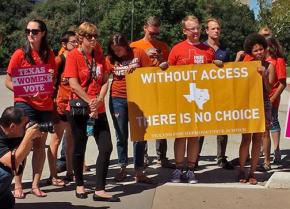No clinics means no choices
reports from a protest against a federal appeals court decision in favor of a harshly restrictive abortion law in Texas.
ABOUT 150 women and their supporters came out to demonstrate at the Texas state Capitol building in Austin on October 3, following the 5th U.S. Circuit Court of Appeals decision that will effectively close all but eight abortion clinics in the state.
The three-judge panel stayed an injunction against implementing several provisions of House Bill 2 (HB2), which passed last summer despite the historic "people's filibuster" that brought out tens of thousands of protesters.
Among other restrictions, the legislation requires that clinics meet the criteria for an ambulatory surgery center and that doctors performing abortions have admitting privileges at a local hospital. These requirements are medically unnecessary since abortion is one of the safest outpatient procedures, and have nothing to do with women's safety and everything with taking away their access to abortion.
In August, a U.S. district judge struck down these restrictions because they placed an undue burden on women trying to obtain an abortion in Texas. The 5th Circuit Court's ruling temporarily reverses this decision.

These unprecedented and unreasonable restrictions on abortion have effectively shut down 32 of 40 clinics in Texas as of today. All of the complying facilities are in major cities. One in six Texas women now live more than 150 miles from the nearest abortion provider.
Demonstrators today expressed their outrage and sadness about this development. "This law has nothing to do with protecting women," said attorney Jan Soifer, a member of the legal team defending the clinics. "This is a war on women."
Activist Cindy Noland and others called attention to the fact that "when there are no clinics, there are no choices."
Leslie Sims called on the crowd not to forget poor women and women of color affected by the law. "We are affected the most. I'm asking you not to forget. We have to come together in solidarity."
MOST OF the calls to action during the rally emphasized voting and block walking for gubernatorial and lieutenant gubernatorial Democratic candidates Wendy Davis and Leticia Van de Putte. Davis gained national attention when she put herself at the center of the opposition to HB2 with a 11th-hour filibuster against the anti-choice bill in the Texas legislature.
But it was the organizing of tens of thousands of abortion rights supporters which made the "people's filibuster" possible. Women from all over Texas descended on the Capitol last summer and gave hours of moving testimony about why they needed access to abortion services.
They told their personal stories about the toll that the lack of abortion services would cause, and they filled the Capitol gallery in angry protest--calling on activists everywhere to "Stand with Texas Women"--against legislators that were taking aim at their right to abortion.
And when Republican lawmakers managed to shut down Davis' filibuster, the protesters filling the Senate gallery continued the fight, chanting so loudly that anti-choice senators couldn't hear well enough to vote.
Several speakers at this week's protest recalled that sense of empowerment that bound the tens of thousands of Texas women together against HB2 into one mighty voice of protest last year. More than one speaker mentioned Hong Kong, arguing that we should emulate the bravery and strength of activists there.
Tiffany Bishop, a leading member of GetEqual, said, "It's not just about voting. We have to be there in the Capitol in legislators' faces every day and remind them what we want them to do."
Activist Amanda Grimes thanked attendees for "bearing witness to unconscionable injustice. On a day like this, we don't want to be alone. We must organize and speak the truth."
If the struggle last year demonstrated anything, our strength is in organizing a fighting movement that takes the right wing's attacks on our reproductive rights head on.


